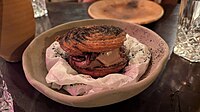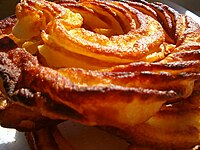Tulumba
This article needs additional citations for verification. (June 2019) |
 Tulumba | |
| Alternative names | balah ash-sham (Arabic: بلح الشام) |
|---|---|
| Type | Dessert |
| Place of origin | Egypt, Ottoman Empire |
| Region or state | Egypt, Countries of the former Ottoman Empire, Balkans, Middle East, South Caucasus |
| Main ingredients | Flour, butter, salt, water, syrup, vanilla extract |
Tulumba or Bamiyeh (Template:Lang-fa; Template:Lang-ar) is a deep-fried dessert found in Egypt, Turkey and the regional cuisines of the former Ottoman Empire. It is a fried batter soaked in syrup, similar to jalebis or churros. It is made from unleavened choux pastry dough (usually about 3 cm long) piped with a pastry bag using an open star or similar tip. It is first deep-fried to golden colour and then sugar-sweet syrup is poured over it when still hot. It is eaten cold.
Name
Tulumba literally means 'pump' in Turkish, deriving from the Italian tromba. The dessert is called pomba in Cypriot Greek and bombacık in Cypriot Turkish. In Armenian cuisine it may be called either pomp or tulumba (Armenian: թուլումբա). Tulumba features in Albanian, Serbian, Bosnian, Bulgarian, Macedonian, Greek (Template:Lang-gr), Azeri (Template:Lang-az) and Turkish cuisines. The sweet is also found in Persian cuisine as bamiyeh (Template:Lang-fa), after the vegetable of the same Persian name (okra), due to its shape. In Hejazi it is called ṭurumba (Template:Lang-ar) directly from Template:Lang-it, but in Egyptian and some Arab cuisines it is called balaḥ ash-Shām (Template:Lang-ar), literally "Syrian dates" or "Damascene dates," though the name may have come from "şambali", another Turkish dessert (the "Şam" in "şambali" corresponding to "Shām" in "balaḥ ash-Shām" and both referring to Damascus). In Iraqi cuisine it is known as datli (Template:Lang-ar), directly coming from Turkish word tatlı.
Main ingredients
It is made from a yogurt[citation needed] and starch based dough, which is fried before being dipped in syrup. It is a special sweet often enjoyed at Iftar in Ramadan.[1] It is also commonly sold alongside jalebi, which is prepared in a similar way, but arranged in a web-like arrangement of strips of dough.
Gallery
-
Tulumba
-
Tulumba with kaymak and pistachio
-
Tulumba cross-section (front)
-
Round
-
Spiral shape
-
Two pieces of shape (Twisted round).
See also
- List of doughnut varieties
- List of fried dough varieties
- List of Turkish desserts
- Buñuelo
- Pinaypay
- Churro
- Gorgoria
- Jalebi
- Lokma
- Fartura (food)
References
- ^ "Muslims break fast on first day of Ramadan". USA Today. Associated Press. November 4, 2005. Archived from the original on 2005-10-24. Retrieved August 19, 2010.
External links
 Media related to Tulumba at Wikimedia Commons
Media related to Tulumba at Wikimedia Commons







